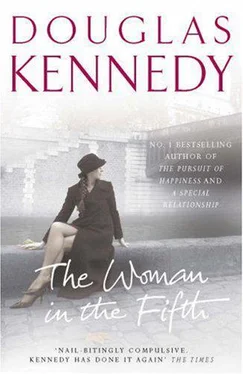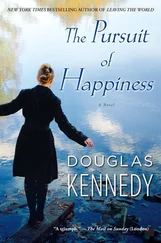‘That’s it!’ she said, standing up. ‘Get dressed and get out.’
But I grabbed her and violently yanked her back on to the bed. When she struggled, I pinned both her arms down and climbed on top of her legs.
‘Now you can answer two questions for me.’
‘Fuck you,’ she said.
‘That scar on your throat …’
She spat in my face. I ignored that and increased my pressure on her hands and legs.
‘That scar on your throat. Tell me …’
‘A botched suicide. Happy now?’
I let her arms go. They lay motionless on the bed.
‘Did you try to kill yourself right after you were released from hospital?’
‘Two days later. In the apartment where I fucked Monsieur Corty.’
‘He asked you to fuck him forty-eight hours after … ?’
‘No. I proposed the idea. He was hesitant, telling me there was no need to rush things. But I insisted. After he’d given me his usual two-minute in-and-out, I excused myself and went into the kitchen and grabbed a bread knife and …’
‘You really wanted to punish him, didn’t you?’
‘Absolutely — even though he was always so good to me. Or as good as anyone could be to a whore.’
‘But the very fact you did it when he was in the next room …’
‘No, it wasn’t a cry for help. If you cut your throat the right way, you die on the spot. I botched it … and Monsieur Corty somehow managed to stop the bleeding and call an ambulance and …’
‘You lived.’
‘Unfortunately … yes.’
‘And Monsieur Corty?’
‘He visited me twice in the hospital, then sent me a check for ten thousand francs — a small fortune back then — with a short note, wishing me well in the future. I never heard from him again.’
‘And the driver of the car?’
‘He was a man with many connections — so he managed to keep everything out of the papers, and the magistrate investigating the case somehow decided to drop the charges from manslaughter to something punishable by a slap on the wrist and a fine. His people offered me compensation. Fifty thousand francs. I refused the offer — until my lawyer reasoned with me and said that I would be spiting myself if I didn’t take his money … especially as he could get it increased by fifty percent. Which he did.’
‘So you accepted the payment?’
‘Seventy-five thousand francs for the lives of the two people who meant most to me in the world.’
‘And the driver just vanished from view?’
‘Not exactly. The world sometimes works in strange ways. Three weeks after the accident, there was an attempted burglary at the home of Henri Dupre. It was the middle of the night, Dupre surprised the burglar, there was a tussle and Dupre was stabbed in the heart. Fatally.’
‘And you felt avenged?’
‘It counted for something, I suppose — especially as Dupre showed little remorse for the murder of my family. His lawyers did all the dirty work for him — but I never even received a card apologizing for the terrible thing he had done. All I received was a check.’
‘So revenge has its virtues?’
‘The standard moral line on revenge is that it leaves you feeling hollow. What bullshit. Everyone wants the wrongs against them redressed. Everyone wants to “get even”. Everyone wants what you Americans call “payback”. And why not? Had Dupre not been killed, I would have lived my life thinking that he’d gotten away with it. That burglar did me a huge favor: he ended a life that was worth ending. And I was grateful to him.’
‘But did it in any way balm the wound?’
‘Hardly. You might come to terms with the loss of a husband — no matter how much you miss him — but you never get over the death of a child. Never. Dupre’s death didn’t mollify my grief — but it did give me some grim satisfaction. And I’m certain that shocks you.’
‘Part of me wants to say, “Yes, I am appalled …”’
‘And the other part?’
‘Understands exactly why you felt that way.’
‘Because you too want revenge?’
‘I haven’t suffered anything like you have.’
‘True, no one died. But you did suffer the death of your marriage, your career. And your child will not speak with you …’
‘As you reminded me earlier.’
‘As you remind yourself every hour of every day. Because that’s how guilt works.’
I stood up and started to get dressed.
‘Leaving so soon?’ Margit asked, sounding amused.
‘Well, it is close to the “witching hour”, isn’t it?’
‘True — but unusually you’re the one leaving without a shove for a change. Now why might that be?’
I said nothing.
‘Answer this question honestly, Monsieur Ricks. The person — I presume it is a man — who did you harm … Wouldn’t you want harm to befall him?’
‘Absolutely. But I’d never perpetrate it on him.’
‘You’re far too ethical,’ she said.
‘Hardly,’ I said, then added, ‘Three days from now?’
‘You are a fool to be pursuing this.’
‘Yes, I am.’
‘Three days then,’ she said, reaching for her cigarettes.
Later that night, as I sat at my desk in my windowless office, Margit’s story continued to rattle around my head. The sheer terrible randomness of it all — the way life can come completely asunder in a moment — nagged at me all night. It also explained plenty about Margit’s emotional reticence and the way she kept a certain distance from me. The longer I dwelled on it, the more I realized just how haunted she was by this appalling calamity, and how the grief would only end with her own death. Margit was right: there are certain tragedies from which we never recover. We may eventually adjust to the sense of loss that pervades every waking hour of the day. We may accept the desperate sadness that colors all perception. We may even learn to live with the loss. But that doesn’t mean we will ever fully cauterize the wound or shut away the pain in some steel-tight box and consider it vanquished.
I finally got back to work, cranking out the usual thousand words. But when 6 a.m. finally showed up, I couldn’t break free of my confinement, as this was the first night when I agreed to a twelve-hour marathon in exchange for a day off. The extra six hours dragged by. I forced myself to write another thousand words. I read another fifty pages of Simenon’s La Neige etait sale , gripped by his account of France under German occupation. Eventually I found myself pacing the room and actually doing situps on the concrete floor in an attempt to keep blood circulating and my brain awake. There were a few callers in daylight. Their images were clearer on camera. They were all men of seemingly Turkish origin, and they all kept their heads turned downward as they uttered the necessary password into the speakerphone. Who, I often wondered, was Monsieur Monde? Someone you don’t need to know .
When noon arrived, I found myself blinking into the sunlight and needing to take in extended lungfuls of air and staggering home without the usual croissants and remembering to set the clock for 7 p.m. that night, and falling into a vast empty sleep, and waking with a jolt, and thinking how strange my existence was now: an all-night non-job, a sortof girlfriend who would only see me every three days, and the realization that — even though this was allegedly my ‘day off ‘ — I would be staying awake all night, as I couldn’t suddenly break the sleep-by-day schedule I had been living since starting this idiotic, wretched job.
So when I came to during the early evening, I hurried off to the Cinema Grand Action on the rue des Ecoles where a new print of Kubrick’s Spartacus was being shown at 20h15. When it let out at 23h30 I kept thinking, Margit’s apartment is just a five-minute walk from here. But I turned away and found a Mexican place off the boulevard Saint-Germain that did very authentic guacamole (or what I took to be authentic guacamole) and even better margaritas, and wonderful enchiladas washed down with Bohemia beer. The meal cost me fifty euros and I didn’t give a damn, because I had just worked twelve hours, and this was my first night off in almost two months, and I was determined to throw financial caution to the wind tonight and get a little smashed and fall about Paris like a pinball. So when I finished my meal, I stopped in a tabac and bought a Cohiba Robusto and sauntered across the Seine, puffing happily on this absurdly expensive Cuban cigar and eventually reached Chatelet and a string of jazz clubs on the rue des Lombards. As it was almost one thirty in the morning, the guy on the door let me into Sunside without hitting me for the usual twenty-euro cover charge. I threw back a couple of whiskies and listened to a so-so local chanteuse — thin, big frizzy hair, a reedy voice that still somehow managed to swing with the Ellington and Strayhorne standards which she sang with her backing trio. When the set finished and the club emptied, I found myself on foot toward the Tenth arrondissement . It was well after two. This corner of Paris was deserted, bar a few entangled couples, and the street people who would once again be sleeping rough tonight, and the occasional drunk like myself. I followed the boulevard de Sebastopol most of the way home. As I got to Chateau d’Eau the smattering of Africans on the street looked at me as if I was a cop, taking a step back as I strode by. The rue de Paradis was shuttered — the Turkish workingmen’s cafes long closed. Ditto the bobo restaurants. The occasional street lamp cast an oblong shaft of light on the pavement. There was no traffic, no ambient urban noise — just the percussive click of my heels punctuating the night … until I heard the tinny beat of shitty pop music up ahead, and saw that my local dingy bar was still open.
Читать дальше












